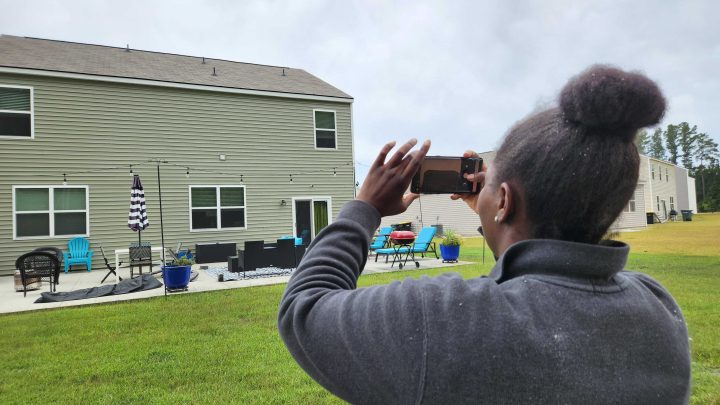
Georgia program offers solar panels to lower-income households
Georgia program offers solar panels to lower-income households

Adding solar panels to your roof can lower your power bills, reduce your carbon footprint and earn you some sizable federal tax credits. But the upfront cost can be huge: tens of thousands of dollars to buy and install the panels, meaning home solar remains out of reach for many people. A new pilot project in Georgia is trying to change that.
Seth Gunning and Nicole Lee recently sized up a house near Savannah, agreeing it was “ideal” and “solar-ready.” They’re both solar installers — contractors with the new Georgia BRIGHT solar leasing program. Lee said this house is perfect.

“This is an amazing candidate for solar, because it is solar-ready,” she said. “We know they have the newer upgraded electrical system. Plenty of sun because it is a newer neighborhood. So there are no mature trees.”
If the homeowner signs on, he won’t buy solar panels; instead, he’ll lease the system from the national nonprofit that runs the Georgia BRIGHT program, the Capital Good Fund.
And the savings could be huge. “So just with solar, after his lease payment, he’s looking at a savings of about $400 a year,” Gunning said.
The Georgia BRIGHT program is for people who earn less than $100,000 a year. It’s especially important to provide solar for those households, who usually have to spend a greater share of their income on energy, said Lee.
“This program levels the playing field for those families who are facing those energy burdens to help them reduce their energy costs,” she said.
Because installing solar costs a lot upfront, those families with the highest energy burden often can’t afford it. There’s a substantial federal tax credit to offset the cost, but you need a tax liability to claim it — so again, people with less income have often missed out. Until now.
A recent change to federal law allows nonprofits to claim the clean energy tax credit for rooftop solar through a direct refund.
“So, if it’s a $10,000 system, and we’re gonna get a $3,000 refund check from the IRS, it costs us less to purchase the system,” explained Andy Posner, the founder and CEO of Capital Good Fund.
Solar leasing isn’t new. But this tax change is. Because of it, Posner said his company can charge less than many for-profit solar installers.
“Also, because we don’t have the same requirements for return on investment as a for-profit,” he said.
Savannah homeowner David Morgan bought his 1955 house a couple years ago. He’s been wanting to install solar panels and said the Georgia BRIGHT program felt like a good fit. Right now, his electricity bill is around $270 a month.
Once his panels are installed, “I’ll be into the solar panel program for $98 a month,” he said. “And I should be using between $60 and $70 a month from Georgia Power.”
That’s a savings of about $100 a month. Morgan makes $65,000 in the disaster response industry. He said he’ll put his solar savings toward retirement. “Every little bit helps towards trying not to work when I’m old.”
Plus, Morgan added that he’s glad he’ll be doing his part to fight climate change.
“If more folks get on board with trying to go with renewable energy and get away from just things that are really doing more harm than good,” he said. “And this is one of those programs that anybody can actually get involved in.”
The Georgia BRIGHT program is aiming to add solar to around 200 roofs in the Atlanta and Savannah areas in the next few months. After that, the organizers hope to expand.
This coverage originally ran on WABE, and is made possible through a partnership with WABE and Grist, a nonprofit, independent media organization dedicated to telling stories of climate solutions and a just future.
There’s a lot happening in the world. Through it all, Marketplace is here for you.
You rely on Marketplace to break down the world’s events and tell you how it affects you in a fact-based, approachable way. We rely on your financial support to keep making that possible.
Your donation today powers the independent journalism that you rely on. For just $5/month, you can help sustain Marketplace so we can keep reporting on the things that matter to you.












